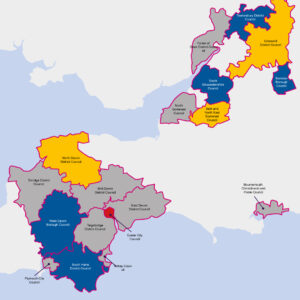Every business aspires to breathe the rarefied air that filled the halls of a brand like Barings. The City’s oldest bank, the bluest of the blue chip, counted the Duke of Wellington and Napoleon among its illustrious clientele. From the Louisiana Purchase to funding the American war effort, Barings was an institution which rivalled even the power of nations at its height. The Queen, naturally, banked with Barings.
Little in the storied existence of Barings, a financial powerhouse founded in the 1760s, suggested that it would end in ruin, at the feet of builder’s son from Watford.
But end it did, 25 years ago today.
The collapse of Barings and its very public post-mortem, conducted in the tabloid press and the House of Commons, teaches lessons well beyond banking and financial markets. The lessons of Barings cut to the very heart of how a business governs itself, implements best practise, and reacts to danger.
Nick Leeson was only 25 when Barings sent him to head-up their new operation on the Singapore International Monetary Exchange (SIMEX). His disqualification from a broker’s licence in the UK was conveniently never mentioned to the Singaporean authorities.
As general manager, Leeson oversaw both the trading-floor activity and the backroom business. He soon started to make unauthorised trades, generating big profits for the bank and lining his pockets with generous bonuses. Leeson was the darling of Barings.
With the good times, however, came the bad. After a string of failures in the next three years, and losses mounting constantly, Leeson made a desperate trade on 16th January 1995. Just a few hours later the infamous Kobe earthquake wiped 2.5% off Japan’s GDP, along with any value in Leeson’s Singapore trades.
Nick Leeson had lost $1.4 billion. Barings was broke. The City’s oldest bank liquidated on 26th February 1995.
The dust may have settled on the collapse, while its lurid details passed into legend, but the lessons it provides for business still resonate today.
Management Knowledge of Business Practices
One shocking revelation of the collapse, not least to the parliamentarians conducting its post-mortem, was the paucity of understanding that senior staff at Barings had about what their group actually did.
In July 1995, on publication of the Board of Banking Supervision’s report into the incident, Lord Bruce of Donington was bewildered by the basic recommendations being made. One such suggestion, he told his fellow peers, was for management teams to ‘understand fully the business they manage’.
‘Really!?’ he went on to exclaim to the House of Lords, ‘I would have thought that is was an elementary assumption to make that the controllers should understand the nature of the businesses they are trying to control.’
The Barings collapse was due in no small measure to the fact that Leeson had more of an idea of what he was doing than his superiors. This is not to say that the required standard for management is omnipresence, or that micro-managing is necessary to avoid to disaster. However, a strong working knowledge of the business you are managing within, in theoretical and practical terms, can serve in both the prevention of errors originally, and their detection before they are exacerbated.
As a successful business’ practices are likely to constantly evolve, it is the duty of management teams to keep pace with the changing nature of their staff’s work and processes.
Oversight and Accountability
The examination of oversight in the case of Barings, both externally and within the institution, was conducted with as much of an interest in apportioning blame as it was to correct structural failings. Incoming chancellor Gordon Brown dealt decisively with external oversight in May 1997: the powers held by the Bank of England since 1946 were to be stripped, and instead held by his new Financial Services Authority from 1998.
However, it was internal modes of oversight which had proved most devastating to Barings. In his dual roles, both front and back of house, Leeson was essentially accountable to himself. His knowledge of the mechanisms on both sides, as well as his superiors’ tacit acceptance of the situation, meant that errors and malpractice could thrive.
There is nothing fundamentally undesirable about staff having a role to play in various parts of any business, in fact that is usually preferable in terms of transferrable skill. What is not preferable, however, is for one person to control both a profit-focussed sector of a business, while also controlling the apparatus that reports on that sector’s performance.
Where silos of this nature develop, errors (which may not be ill-intentioned) can compound to proportions which risk an entire business. For the protection of the organisation, as well as those people who could be placed into a potential conflict of interest, oversight is best decentralised from those conducting the firm’s daily business.
The Primacy of Profit
The objective of almost any business undertaking is the generation of profit. That is not to say that all endeavours are undertaken in a selfish manner – the danger lies in a pursuit of profits obscuring all else.
Leeson was transferred more than £500m by the Barings board to cover his trading, a sum greater than all of the bank’s capital, without any questioning. Early profits from Singapore fuelled a desire for more, while managerial failings and overt greed coalesced into a disaster waiting to happen.
The purpose of a business must not be solely to make profits, but rather to become resilient enough to go on making profits for a long time. Having survived since the 18th Century, this is a tenet which Barings should have understood well. That everything accumulated in that time could be lost in a few short years demonstrates the fatal lack of resilience which Barings had nurtured.
Firms must have the self-awareness to discern proactive, confident business practices from outright gambling. To this end, no single venture should consume such vast resources that it threatens the viability of the company’s other activities. This is gambling not only with money, but with careers, reputations and livelihoods.
Lessons for Leeson?
For Nick Leeson’s part he had ample time to consider the fallout, spending four years in Singapore’s Changi prison. He emerged in 1999 to see Hollywood star Ewan McGregor portray him on the silver screen in the movie Rogue Trader.
The collapse was a disaster for those who relied on the Barings Foundation, which in 1994 was the UK’s biggest corporate charitable donor. Disability and homeless charities were among those missing out, along with Third World aid projects and patronage of the arts.
The High Court declared Deloitte to be negligent in their duties as Barings’ auditor, for failing to expose Leeson’s rogue trading. Despite this, the presiding Justice Evans-Lombe believed that the bank’s internal failings were so extensive as to be terminal in any event from 1994 onwards.
Ten Barings executives were disqualified as directors, never to grace the City again. Ron Baker, Leeson’s boss, somewhat optimistically sued for his vanquished £880,000 bonus. He was declined.
25 years on from its chaotic end, Barings endures today as a testament to the toll which greed, apathy and ignorance can take on any business.


